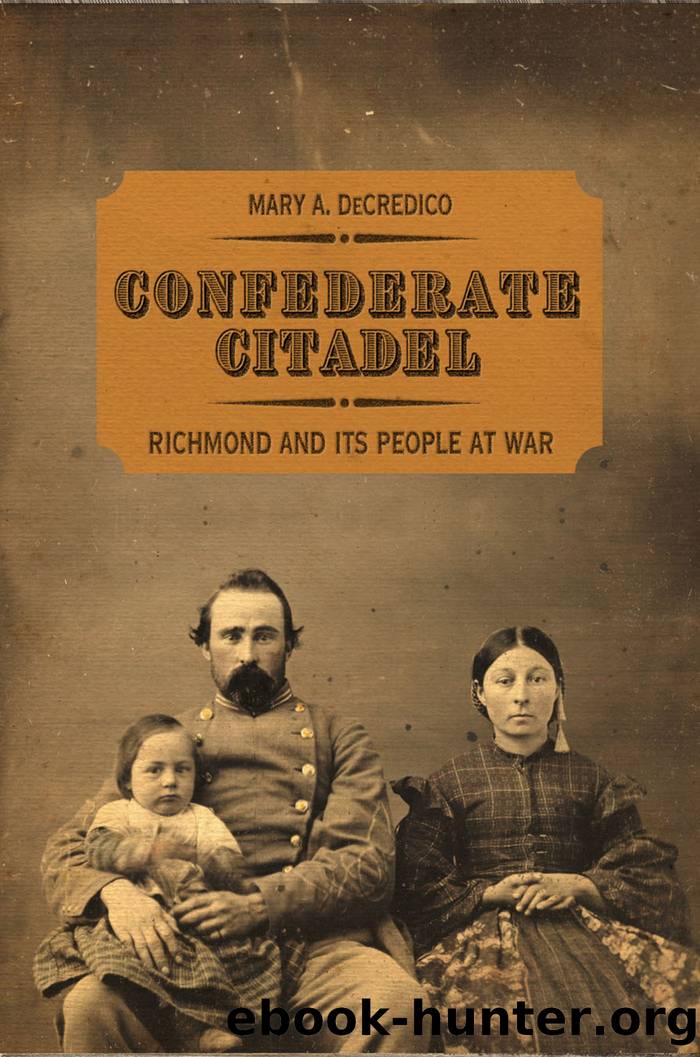Confederate Citadel by Mary A. DeCredico;

Author:Mary A. DeCredico;
Language: eng
Format: epub
Publisher: University Press of Kentucky
Published: 2020-04-15T00:00:00+00:00
The Fall of Richmond, 1865. Currier and Ives.
The local press urged Mayor Joseph Mayo to do something about the licentiousness in the capital. The Richmond Enquirer wrote, âNever was a place more changed than Richmond. Go on the Capitol Square any afternoon, and you may see these women promenading up and down ⦠jostling respectable ladies into the gutters.â A relatively new publication in Richmond, Southern Punch, was similarly outraged by the state of the capital: âIt has been asked, was there ever since the days of Sodom and Gomorrah, such a state of society as exists at present? Rogues, gamblers, swindlers, cutthroats infest us on all sides. Extortioners swarm at every turnâ¦. [T]he Devil stalks at broad daylight in open view of everyone, without the care or precaution of dressing himself. In fact, cheating, swindling, garroting is [sic] the order of the day.â63
Rivaling debauchery as a source of concern was the continued increase in robberies. The Richmond press daily reported robberies of everything from wood and soap to food and clothing. Sallie Putnam noted that virtually everyone in Richmond feared they would be targeted: âIn addition to our other miseries, robberies were fearfully on the increase. The fortunate possessor of a well-stocked larder or coal house was in constant danger from burglary. It became an almost universal fashion in Richmond to permit âevery day to take care of itself.â It was useless to lay up for the morrow, or anticipate the rise in prices, and provide against it, for the cunning housebreakers were still better at calculation, and would ever upset the best laid schemes by their successful midnight depredations.â The city council was well aware of the rise in crime in overpopulated Richmond. As early as January 1864, the city fathers passed a resolution creating the Committee on Police to investigate the problem and make recommendations to correct it. Despite the augmentation of the night watch, robberies continued to plague the city until the Federal army took control in April 1865 and declared martial law.64
The Confederate Army of Northern Virginia in the trenches at Petersburg was suffering through one of the coldest winters of the war. Everywhere, it seemed, there was hunger. J. B. Jones noticed that his daughterâs cat could barely move because there was no cat food. Jones admitted, âSometimes I fancy I stagger myself. We do not average two ounces of meat daily; and some do not get any for several days together. Meal is $50 per bushelâ¦. Bacon brought $7.75 per pound.â Things did not improve. Jones wrote barely a month later, âIt is now a famine, although I believe we are starving in the midst of plenty, and if it were only equally distributed. But the government will not, it seems, require the railroads to bring provisions to the exclusion of freight for the speculators.â65
The Federal high command was also cognizant of Richmondâs plight. General Grant commented later in his memoirs, âSupplies were growing scarce in Richmond, and the sources from which to draw them were in our hands.
Download
This site does not store any files on its server. We only index and link to content provided by other sites. Please contact the content providers to delete copyright contents if any and email us, we'll remove relevant links or contents immediately.
Cat's cradle by Kurt Vonnegut(15324)
Pimp by Iceberg Slim(14476)
4 3 2 1: A Novel by Paul Auster(12362)
Underground: A Human History of the Worlds Beneath Our Feet by Will Hunt(12080)
The Radium Girls by Kate Moore(12012)
Wiseguy by Nicholas Pileggi(5762)
The Fire Next Time by James Baldwin(5421)
Perfect Rhythm by Jae(5391)
American History Stories, Volume III (Yesterday's Classics) by Pratt Mara L(5293)
Paper Towns by Green John(5173)
Pale Blue Dot by Carl Sagan(4992)
A Higher Loyalty: Truth, Lies, and Leadership by James Comey(4945)
The Mayflower and the Pilgrims' New World by Nathaniel Philbrick(4483)
The Doomsday Machine by Daniel Ellsberg(4480)
Killers of the Flower Moon: The Osage Murders and the Birth of the FBI by David Grann(4432)
The Sympathizer by Viet Thanh Nguyen(4382)
Too Much and Not the Mood by Durga Chew-Bose(4332)
The Borden Murders by Sarah Miller(4302)
Sticky Fingers by Joe Hagan(4181)
